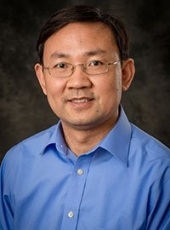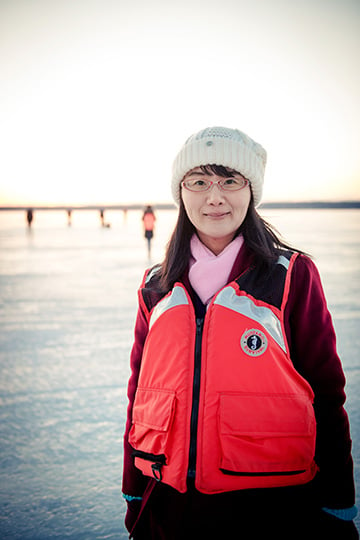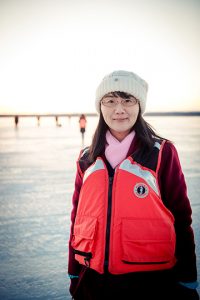 Zhenlin Wang (SAS), professor of computer science, is co-author of the article, “Lightweight and accurate memory allocation in key-value cache,” published in the June 2019 issue of the International Journal of Parallel Programming, which is published by Springer.
Zhenlin Wang (SAS), professor of computer science, is co-author of the article, “Lightweight and accurate memory allocation in key-value cache,” published in the June 2019 issue of the International Journal of Parallel Programming, which is published by Springer.
Abstract: The use of key-value caches in modern web servers is becoming more and more ubiquitous. Representatively, Memcached as a widely used key-value cache system, originally intended for speeding up dynamic web applications by alleviating database load. One of the key factors affecting the performance of Memcached is the memory allocation among different item classes. How to obtain the most efficient partitioning scheme with low time and space consumption is a focus of attention. In this paper, we propose a lightweight and accurate memory allocation scheme in Memcached, by sampling access patterns, analyzing data locality, and reassigning the memory space. One early study on optimizing memory allocation is LAMA, which uses footprint-based MRC to optimize memory allocation in Memcached. However, LAMA does not model deletion operations in Memcached and its spatial overhead is quite large. We propose a method that consumes only 3% of LAMA space and can handle read, write and deletion operations. Moreover, evaluation results show that the average stable-state miss ratio is reduced by 15.0% and the average stable-state response time is reduced by 12.3% when comparing our method to LAMA.
Citation: Pan, C., Zhou, L., Luo, Y., Wang, X., & Wang, Z. (2019). Lightweight and accurate memory allocation in key-value cache. International Journal of Parallel Programming, 47(3), 451-466.http://dx.doi.org/10.1007/s10766-018-0616-4
Digital Commons link: https://digitalcommons.mtu.edu/michigantech-p/144/
Springer link: https://link.springer.com/article/10.1007%2Fs10766-018-0616-4
 By Karen Johnson, ICC Communications Director
By Karen Johnson, ICC Communications Director
Underwater acoustic communication has been in use for decades, but primarily for military applications. In recent years, private sectors such as environmental monitoring, off-shore oil and gas exploration, and aquaculture have become interested in its possibilities.
But existing research about underwater acoustic communication networks often relies on human-operated surface ships or cost-prohibitive autonomous underwater vehicles (AUVs). And these cost barriers can limit academic research evaluation to computer simulations, constraining research innovation towards practical applications.
Recognizing the above gap, Michigan Tech Institute of Computing and Cybersystems (ICC) researchers Zhaohui Wang, assistant professor, Electrical and Computer Engineering, and Nina Mahmoudian, adjunct professor, Mechanical Engineering-Engineering Mechanics, saw an opportunity to combine their areas of expertise: for Wang, underwater acoustic communications, for Mahmoudian, low-cost marine robotics and AUVs.
Also part of the research team were PhD student Li Wei, Electrical and Computer Engineering, and post-doc research engineer Barzin Moridian, Mechanical Engineering-Engineering Mechanics. The team also collaborated with scientists at Michigan Tech’s Great Lakes Research Center.
With a $50K seed grant from Electrical and Computer Engineering alumnus Paul Williams ’61, the team took the research beneath the surface to develop a low-cost marine mobile infrastructure and investigate the challenges and possible solutions in engineering a leading-edge AUV communication network.
They broke it down into three areas: the development of low-cost, high-modularity autonomous surface vehicles (ASVs), each equipped with a collection of sensors and serving as surrogates for AUVs; equipping each ASV with an acoustic modem and implementing communication and networking protocols to facilitate underwater communication among the vessels; and conducting field experiments to collect data about the fundamental challenges in mobile acoustic communications and networking among AUVs.
The team’s outcomes included two low-cost, autonomous, on-the-water boats; an experimental data set, data analysis, and preliminary results; a technical paper presented at the 2018 IEEE OES Autonomous Underwater Vehicle Symposium; and a marine mobile wireless networking infrastructure for use in continued research.
Just half of their seed grant has been used, and this summer Wang and Mahmoudian will work to improve the boats and the communications system, and conduct more field research. In addition, they are planning to write two National Science Foundation proposals to take their research even further.
Download a summary of the research from the ICC website at icc.mtu.edu/downloads.
Seed grant donor Paul Williams is also the benefactor of the Paul and Susan Williams Center for Computer Systems Research, located on the fifth floor of the Electrical Energy Resources Center. The 10,000-square-foot, high-performance computing center—the home of the ICC—was established to foster close collaboration among researchers across multiple disciplines at Michigan Tech
The ICC, founded in 2015, promotes collaborative, cross-disciplinary research and learning experiences in the areas of cyber-physical systems, cybersecurity, data sciences, human-centered computing, and scalable architectures and systems. It provides faculty and students the opportunity to work across organizational boundaries to create an environment that mirrors contemporary technological innovation.
Five research centers comprise the ICC. The ICC’s 50 members, who represent 15 academic units at Michigan Tech, are collaborating to conduct impactful research, make valuable contributions in the field of computing, and solve problems of critical national importance.
Visit the ICC website at icc.mtu.edu. Contact the ICC at icc-contact@mtu.edu or 906-487-2518.

Zhaohui Wang (CPS) is the recipient of an NSF CAREER Award for her research in underwater communication networks. Wang plans to improve underwater acoustics networks to maximize information delivery. ICC Co-Director, Dan Fuhrmann commented, “Her research activity is quite remarkable. In this proposal, Wang describes an ambitious plan to bring state-of-the-art tools in signal processing and machine learning to the difficult problem of underwater acoustic communication.” Read more about Wang’s research in the Michigan Tech News.